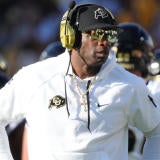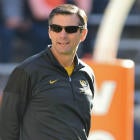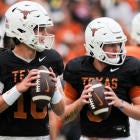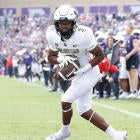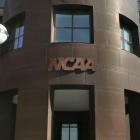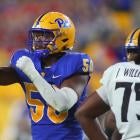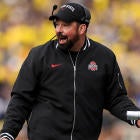The NCAA on Tuesday announced it will begin the process to allow college athletes to profit from their name, image and likeness in what appears to be a sweeping culture change for the nation's largest amateur body. The vague announcement, though, comes with an obvious question: What exactly does it mean?
The NCAA Board of Governors announced in a release that it "voted unanimously" to allow athletes "to benefit from their name, image and likeness." Furthermore, it is directing all three divisions to immediately consider "updates to relevant bylaws and policies for the 21st century."
"We must embrace change to provide the best possible experience for college athletes," said Ohio State president Michael Drake, chair of the Board of Governors. Additional flexibility in this area can and must continue to support college sports as a part of higher education."
On its surface, this future rule adjustment appears to be the biggest legislative sea change for the NCAA since it lost control of football television in the famous 1984 Supreme Court case.
Except this isn't a loss, per se. It is somewhat of a course correction ... for now.
Those same restrictive name, image and likeness bylaws will continue to exist until NCAA membership comes up with something better, no later than January 2021.
An abrupt change creates questions
The announcement seems to signal a sudden turnaround from the NCAA's prior stance. It previously did not allow athletes to profit from their name, image or likeness; if they tried to do so, they would face NCAA sanctions. Scholarship athletes previously lost their eligibility for promoting skills in other endeavors because of what many considered outdated rules.
Just last month, NCAA president Mark Emmert said the name, image and likeness issue was an "existential threat" to the collegiate model. The moving target that has always been NCAA amateurism seems to be in for a radical move again.
Someday soon, it seems players are going to be able to benefit from their birthright, just like the rest of us are able to if put in a similar position.
But how? What does "benefit from" mean? Straight cash? Money held in escrow until graduation? Gift cards?
And what about recruiting? For those athletic directors on the ground, that's the key question. How far can name, image and likeness rights go when there is a five-star available like Tua Tagovailoa or Zion Williamson? Will recruits or scholarship athletes now be able to be paid for endorsing a product? Will there be a limit on that compensation?
Kicking the can down the road
Tuesday's announcement indicated a sea change without providing direct answers or rule adjustments. For now, it's up to the existing working group to gather more information. The NCAA, in a sense, stiff armed the state and federal regulations that are in the pipeline. In other words, the NCAA is claiming, "Hold on, we're doing something" while not yet doing much of anything.
"Today, this ruling it offers no insight as to how to resolve this," said U.S. Rep. Mark Walker (R-NC), who proposed a federal name, image and likeness law that could be considered as early as next year.
There were few specifics offered by the board on Tuesday. After getting recommendations from a working group that had been in place since May, the board said:
- Athletes must be treated similarly as non-athletes "unless a compelling reason exists to differentiate."
- Any changes must "ensure fair and balanced competition."
- There must be differentiation between collegiate and professional opportunities.
- A reaffirmation that athletes are students first and not university employees.
- Any change must "protect the recruiting environment".
The NCAA is under increased pressure to change its amateurism rules. Those rules have always been a moving target, adjusted as legal and social pressures were applied.
Why is this happening now?
California recently passed the "Fair Pay to Play" act, allowing athletes to profit from their name, image and likeness as of January 2023. Several other states have similar bills in different stages of the legislation process, but many have start dates far preceding 2023. A recently-introduced Florida bill, in fact, has an action date of July 2020 -- ahead of the next college football season. That's a full season before the NCAA's target date of January 2021.
There is also growing federal pressure on the NCAA as the U.S. Congress is considering national legislation to provide athletes with the rights they have so long deserved. Multiple lawsuits aimed at the NCAA's current cap on the full cost of a scholarship are also making their way through the courts.
In other words, as the NCAA has done on countless occasions when backed into a legal corner, it blinked. It must change. Either that or the states and federal government are going to change things for them.
This time, it took the form of a press release that made for a good headline but offered few specifics.
Critics know the NCAA is on tilt
"We clearly have the NCAA's attention," Walker said. "Now, we need to have their action. While their words are promising, they have used words in the past to deny equity and basic constitutional rights for student-athletes. The NCAA is on the clock, and while they are, we're going to keep working towards the passage of the Student-Athlete Equity Act to make sure their words are forced into action."
Walker's co-sponsor on the bill, U.S. Rep. Cedric Richmond (D-LA), called the current collegiate model a "sham definition of amateurism."
The outspoken National College Players Association went as far to call Tuesday's announcement a "continued state of denial." The NCPA announced Monday it had partnered with the NFLPA to explore NIL opportunities for athletes.
Twitter erupted in joy for a second when a digital content producer from Cleveland simply posted a picture of Trevor Lawrence on a resurrected version of the EA Sports football video game.
LET'S GOOOOOOOOOO pic.twitter.com/8Sa4AJbWlf
— Ben Axelrod (@BenAxelrod) October 29, 2019
Yeah, the implied reality of players getting paid for being on the cover of the beloved game seemed possible. But Tuesday's release did not address anything close to that possibility.
Where do we go from here?
It now seems that ill-defined collegiate model has been stripped clean for some repainting. In the future, athletes will be able to earn something for the product (the games) they define. It's not just Williamson bringing millions to Nike and Duke. Ideally, it's also those Division III volleyball players who work 50 hours a week on their sport.
Admittedly, their share might be a smaller piece of the pie, but at least there would be pie. Defenders of the current system harped on the current benefits athletes receive -- three square meals, enhanced insurance, cost of attendance.
"That's as discriminatory a comment as you can make," Walker said. "You don't let them have access to name, image and likeness because we're going to feed them a little bit. Are you kidding me? The patronizing here is off the chain."
Walker called it a "human rights issue." Meanwhile, those athletic directors mentioned above are freaking out.
When that next Tim Tebow comes along, should he should be able to market himself in some form -- commercials, endorsements, his own shoe deal?
While we wait for a definitive answer, it's more than ironic that -- in the same building where NCAA enforcement is going after college basketball bluebloods for paying players in the FBI scandal -- there is at least consideration that players are about to be (legally) paid.









